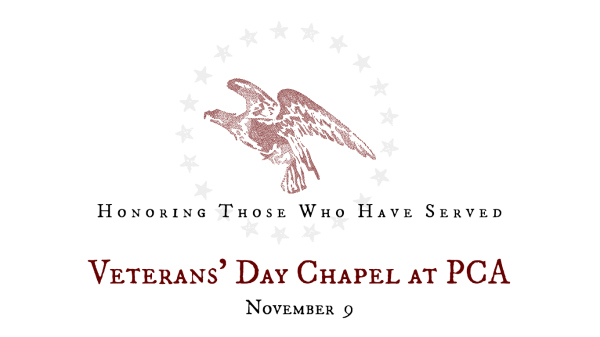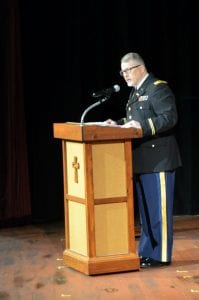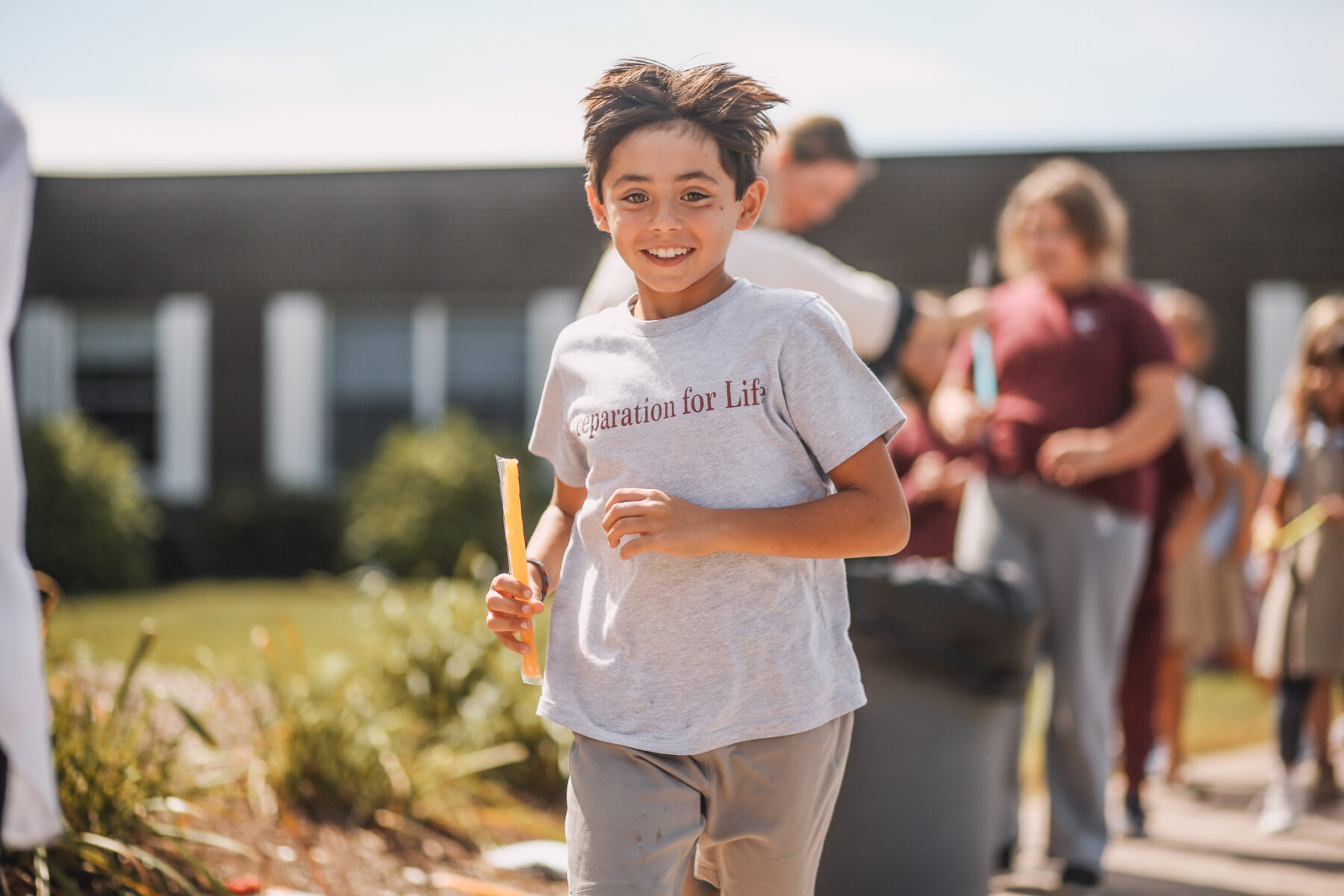Veterans’ Day Chapel at PCA
On November 9, PCA celebrated Veterans’ Day at a special all-school chapel.


Veterans’ Day Chapel Address
Dr. Raymond Gamble, Upper School History Teacher
Greetings, Dr. Engstrom, distinguished guests, fellow veterans, my colleagues on the staff/faculty, Class of 2018, and PCA Students.
As George Orwell famously pointed out, people sleep peacefully in their beds at night only because rough men stand ready to do violence on their behalf. Orwell recognized the state’s role in using force as a means of protecting the weak, the innocent, and the unprepared. Orwell witnessed Britain institute the holiday of Armistice Day on November 11th, 1919, in honor of the first anniversary of the armistice that ended the Great War, signed in a train car in Compiegne, France and taking effect on the 11th hour of the 11th day of the 11th month of 1918. The U.S. did the same, but a campaign by Raymond Weeks after World War II led Congress and President Eisenhower to change the name of the holiday in 1954 to expand the tribute to all the men and women who have served in the Armed Forces of the United States. So today we are gathered in honor of Veterans Day. The first time I took part in such a ceremony at Portsmouth Christian High School, as we were know at the time, my notes were in a smaller font, my moustache was a different color, and there was a junior in attendance named Neil Lambrecht who is about ready to retire from the Air Force as a senior non-commissioned officer currently serving on recruiting duty.
During the late 1960s, Edwin Starr characterized popular discontent with the Vietnam War by posing a musical question.
War, whoa, lord/What is it good for/Absolutely nothing, listen to me
It ain’t nothing but a heart-breaker/(War) friend only to the undertaker/Oh, war it’s an enemy to all mankind/The point of war blows my mind/War has caused unrest/Within the younger generation/Induction then destruction/Who wants to die, ah,
War-huh, good god why yall/What is it good for/Absolutely nothing/Say it, say it, say it/War, huh
What is it good for/Absolutely nothing listen to me
It ain’t nothing but a heart breaker/(War) it’s got one friend that’s the undertaker/Oh, war, has shattered many a young man’s dreams/Made him disabled, bitter and mean/Life is much too short and precious/To spend fighting wars these days/War can’t give life/It can only take it away
War is good for absolutely nothing? My initial response is that the young Mr. Starr was something of a clueless goober. I would suggest that someone who did not understand why Starr was wrong might want to google Carthage, the Confederate States of America, and the Third Reich. History students recognize those states are no longer in existence, and not because of disease, famine, or merger into some larger political structure. No, they were crushed by superior military forces: those of Rome, the Union, and the Grand Alliance, respectively. War did it. War has, at least at times, been a force for good in opposition to such evils as child sacrifice, slavery, and the Holocaust.
War is about killing people and breaking things. War is one of the costliest pursuits in human history in terms of dollars, relationships, and lives. The business of war is perhaps man’s toughest profession. The soldiers, sailors, airmen, and marines who have served our nation have been asked to leave their homes and families, travel to far-off places, subsist on unappetizing rations, live in uncomfortable conditions, and prepare for the possibility of fighting by undergoing tough training. A portion of these soldiers were volunteers; the majority, up through the Vietnam War, were drafted. For some of each group, their training was followed by actual combat operations.
Those troops ventured out into battle against large numbers of armed, hostile service members of opposing countries, at places like Bunker Hill, Lundy’s Lane, Antietam, Kettle Hill, the Argonne Forest, Guadalcanal, Omaha Beach, the Chosin Reservoir, the Ia Drang Valley, 73 Easting, Mogadishu, and Fallujah. They swallowed their fears, for the most part, and faced bullets and explosive devices in myriad forms, in accordance with the technology of the time. These battles have been popularized in films such as Saving Private Ryan, We Were Soldiers, Black Hawk Down, and Lone Survivor. I rather suspect that our counterparts over in Britain are hearing mention of Christopher Nolan’s latest, Dunkirk.
To give Edwin Starr credit, he made clear why the Vietnam War had become so unpopular with the American people. He sang, “(War)”, It ain’t nothing but a heartbreaker; (War), Friend only to the undertaker.” Over 1.25 million Americans have died in war. The numbers roll out: the Civil War: 620,000; World War II: 410,000; World War I: 116,000; Vietnam: 58,000; Korea: 33,000, and so forth. Some of these died in dangerous raids, like the U.S. Army Ranger Assault Group’s attack on Point du Hoc, which separated Omaha and Utah Beaches in Normandy, France, in June of 1944. Others perished in desperate defenses, like Union General Benjamin Prentiss’ division holding the Hornet’s Nest in the face of Ruggles’ Battery, the largest artillery concentration ever formed in North America, trying to buy time for General Ulysses Grant to build a defensive line further to the rear outside of Shiloh, Tennessee, in April of 1862. Some of these servicemen died in very mundane activities such as traffic accidents or loading heavy equipment. My brigade in the Persian Gulf War lost 4 men and women in 3 such incidents.
Shortly after arriving in Saudi Arabia, while gathering equipment from King Abdul Assiz Seaport, we received a report on suspicious activity in a crane. A police patrol responded, and one trooper handed his rifle to his partner and started up the crane. She stepped back to watch as he climbed and inadvertently toppled backwards off the dock into the Persian Gulf, wearing body armor, battle rattle, a gas mask, a helmet, a pistol, and carrying two slung rifles. She drowned. One of our patrols had the driver fall asleep at the wheel of his Humvee, which drifted across the lane of oncoming traffic. The same thing happened to me a month later, and I awoke as my vehicle began to slide down a slope on the left hand side of the road. I don’t know whether this patrol ever awoke; they ran into the front end of a Mercedes ten-ton truck and died upon impact. The last incident is perhaps the most painful to contemplate. Inside a Humvee, a patrol put their magazines inside their 9mm Beretta pistols and let their slides go forward. One soldier squeezed the weapon as it jumped in his hand and accidentally discharged a round. That bullet hit his partner just below the flak vest and killed the soldier’s best friend. The soldier who made the mistake was convicted of manslaughter and sentenced to two years in prison, after attending his best friend’s funeral.
If the biggest price of war is paid on the extended battlefield, another part of that piece involves the home front. Some soldiers don’t come home, and then parents, siblings, wives, children, and friends have a hole in their lives. Other soldiers come home physically, mentally, or emotionally disabled. Starr again captured this side of the Vietnam War: “War has shattered many young men’s dreams, made them disabled, bitter, and mean.” Abraham Lincoln, perhaps our most eloquent president, gave perhaps his most eloquent speech in one of the darkest moments of American history. Lincoln, the subject of this year’s official Veterans Day Poster, spoke as follows during his Second Inaugural Address about a month before his tragic assassination:
Lincoln recognized the debt of society to “care for him who shall have borne the battle, for his widow, and his orphan.” Journalist Joe Gallaway said that he came from a long line of soldiers, including two great-grandfathers, each of whom lost a leg fighting on opposite sides in the Civil War. They happened to lose opposite legs as well. They met by accident, after the war in a shoe store in Galveston, Texas, and then by design met each year afterward, in the same shoe store, to buy a pair of shoes together. I am sure they enjoyed the discount. I suspect that they would have happily surrendered the price savings to get back their mobility.
What do I ask each of you to take from this assembly? Let me invite another distinguished American to share his thoughts on this anniversary.
President Ronald Reagan asked that we work for peace and that we remember the service and sacrifices of those who came before us and built into the national foundation on which we live our lives. As part of that remembrance, thank our veterans and tell their stories, especially to the next generation. Thank you.


